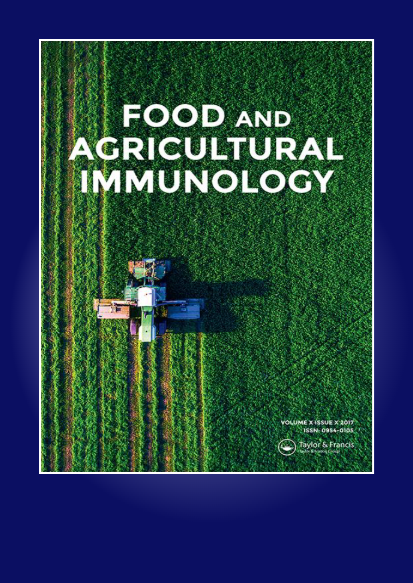木槿根对RAW264.7巨噬细胞的免疫增强作用
IF 2.1
3区 农林科学
Q3 CHEMISTRY, APPLIED
引用次数: 0
摘要
摘要本研究研究了木槿根提取物(HSR)在巨噬细胞中是否具有免疫激活活性,并阐明了其潜在机制。高铁剂量依赖性地增加免疫调节剂如一氧化氮(NO)、诱导型一氧化氮合酶(iNOS)、环氧化酶-2 (COX-2)、白细胞介素-1β (IL-1β)和肿瘤坏死因子(TNF-α)在巨噬细胞中激活的吞噬作用。抑制toll样受体4 (TLR4)可减少HSR诱导的免疫调节剂的产生。抑制丝裂原活化蛋白激酶(MAPKs)、核因子-κB (NF-κB)和磷酸肌醇激酶(PI3K)信号可减弱HSR诱导的免疫调节剂的产生。基于本研究的结果,我们认为HSR通过tlr4依赖性的MAPKs、NF-κB和PI3K信号通路,通过产生免疫调节剂和吞噬激活来激活巨噬细胞。因此,人们认为高铁具有作为增强免疫力的药剂的潜力。本文章由计算机程序翻译,如有差异,请以英文原文为准。
Immune-enhancing effects of Hibiscus syriacus roots in RAW264.7 macrcophages
ABSTRACT In this study, we evaluated whether extracts of the roots of Hibiscus syriacus (HSR) exert immune activation activities and elucidated its potential mechanism in macrophages. The HSR dose-dependently increased the production of immunomodulators such as nitric oxide (NO), inducible nitric oxide synthase (iNOS), cyclooxygenase-2 (COX-2), interleukin-1β (IL-1β), and tumor necrosis factor (TNF-α) activated phagocytosis in macrophages. Inhibition of toll-like receptors 4 (TLR4) reduced the production of immunomodulators induced by HSR. Inhibition of mitogen-activated protein kinase (MAPKs), nuclear factor-κB (NF-κB) and phosphoinositide-3 kinase (PI3K) signaling attenuated the production of immunomodulators induced by HSR. Based on the results of this study, HSR was thought to activate macrophages through the production of immunomodulators and phagocytosis activation through TLR4-dependent MAPKs, NF-κB and PI3K signaling pathways. Therefore, it is thought that the HSR has the potential to be used as agents for enhancing immunity.
求助全文
通过发布文献求助,成功后即可免费获取论文全文。
去求助
来源期刊

Food and Agricultural Immunology
农林科学-毒理学
CiteScore
5.30
自引率
6.70%
发文量
52
审稿时长
2 months
期刊介绍:
Food and Agricultural Immunology is an international open access journal publishing original immunological research with applications in food, agricultural, environmental and veterinary science. Submissions describing the use of immunological techniques and methods are particularly welcomed.
The journal aims to expand our understanding of the interactions at the interface of food and immune systems including studies on:
-Development of diagnostic systems – all types of ligand-based assays, e.g. antibody, aptamer
-Application of ligand-based assays for the detection or identification of molecules of interest in food science, agricultural research, veterinary investigations and clinical systems relating to food allergy or sensitivity to agricultural chemicals
-Effects of food on the immune system
-Studies on allergy and allergic reactions
-Investigations into food allergies
-Development of allergen-free food systems
-Development of novel assay formats
-Applications of assay systems to the monitoring of food items in relation to safety and labelling
-Food quality issues, e.g. speciation, adulteration and contamination
-Comparisons between different analytical techniques
The journal publishes research and review articles and is essential reading for food scientists, immunologists and all those concerned with the interaction between food and immune systems.
 求助内容:
求助内容: 应助结果提醒方式:
应助结果提醒方式:


